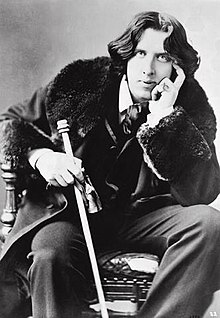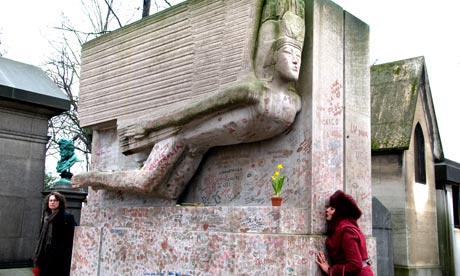A thing is not necessarily true because a man dies for it.
~Oscar Wilde (wiki) (The Portrait of Mr. W. H.)
Democracy means simply the bludgeoning of the people by the people for the people.
~Wilde ("The Soul of Man Under Socialism," Fortnightly Review, February 1891)
A man who knows the price of everything and the value of nothing.
~Wilde (his famous definition of a cynic in Lady Windermere's Fan)
Yet each man kills the thing he loves,
By each let this be heard,
Some do it with a bitter look,
Some with a flattering word.
The coward does it with a kiss,
The brave man with a sword.
~Wilde. (The Ballad of Reading Gaol, Pt. 1, St. 7)
And the wild regrets, and the bloody sweats,
None knew so well as I:
For he who lives more lives than one
More deaths than one must die.
~Ibid., Pt. 3, St. 37
A few more, without attributions:
I don't want to go to heaven. None of my friends are there.
Quotation is a serviceable substitute for wit.
A gentleman is one who never hurts anyone’s feelings unintentionally.
Always forgive your enemies; nothing annoys them so much.
 |
| This rather poorly done statue is in Dublin, near where he was born. |
Work is the curse of the drinking classes.
True friends stab you in the front.
All women become like their mothers. That is their tragedy. No man does. That's his.
Morality is simply the attitude we adopt towards people whom we personally dislike.
Some cause happiness wherever they go; others whenever they go.
I think that God, in creating man, somewhat overestimated his ability.
Today is the 160th anniversary of the birth in Dublin of Irish poet, dramatist, and wit Oscar (Fingal O'Flahertie Wills) Wilde (wiki) (1854-1900) to unconventional parents, both writers. Wilde attended Oxford and became a cult figure in the cause of art for art's sake while pursuing a career as a poet and playwright.
In 1882, he toured the United States on a lecture circuit. Reviews of these lectures were colorful, and opinions ranged from fawning to vitriolic; but for the most part, Wilde fascinated audiences and critics alike, and massive crowds thronged to catch a glimpse as he toured the city.
As Wilde had come to expect, his physical appearance generated intense interest. The San Francisco Chronicle described:
“His long hair was brushed back over his ears… His coat was of black velvet, with lace cuffs. He wore a full lace necktie… His waistcoat was of the orthodox full-dress pattern, but his lower garment was an uncompromising knee-breeches of black velvet, beneath which the not too muscular legs were cased in patent leather shoes with silver buckles; his gloves were white.”
In an interview with the Chronicle, he revealed:
“I find the eastern states… too much of a reflex of English manners and customs… What I like best is the civilization which the people of the West have formed for themselves.”
His most famous plays are the witty comedies, Lady Windermere's Fan (1892), A Woman of No Importance (1893), and The Importance of Being Earnest (1895), and he is also remembered for a single novel, The Picture of Dorian Gray (1891).*
Wilde was a controversial figure on the late Victorian literary scene, and his outrageous wit and bizarre behavior earned him many enemies. Eventually, he served a two-year prison term for homosexuality (although apparently he had a lover there), which resulted in his two poetic masterpieces, The Ballad of Reading Gaol (1898) and De Profundis (published 1905). After his release in 1897 from prison, the experience of which left him a broken man, Wilde spent the last several years of his life in Paris.
The inscription on his tomb in the Pére Lachaise cemetery there is drawn from Part 4 of The Ballad of Reading Gaol:
"And alien tears will fill for him
Pity's long-broken urn,
For his mourners will be outcast men,
And outcasts always mourn."
* N.B. Wilde's play Salome (1893), his version of the biblical story about the step-daughter of King Herod and John the Baptist, was adapted by Austrian writer Hugo von Hofmannsthal (1874-1929) for the libretto of Richard Strauss's 1905 opera of the same name - a major landmark of early 20th-century opera. Here's Ljuba Kazarnovskaya in the "Dance of the Seven Veils" from the opera, which is both an orchestral showpiece and a great piece of theater.
Based on Ed's Quotation of the Day, only available via email. If you'd like to be added to his list, leave your email address in the comments.
More on his trip to San Francisco here, and more quotes here.



No comments:
Post a Comment